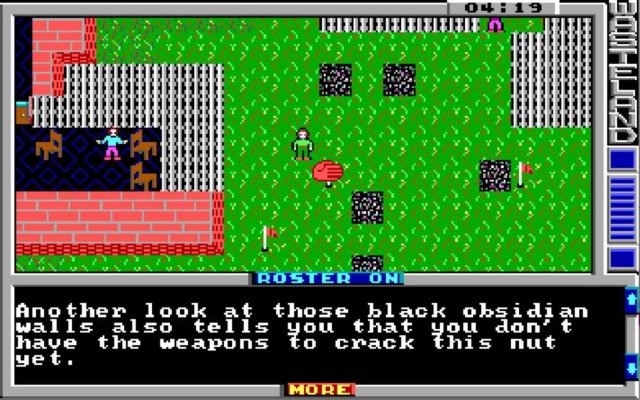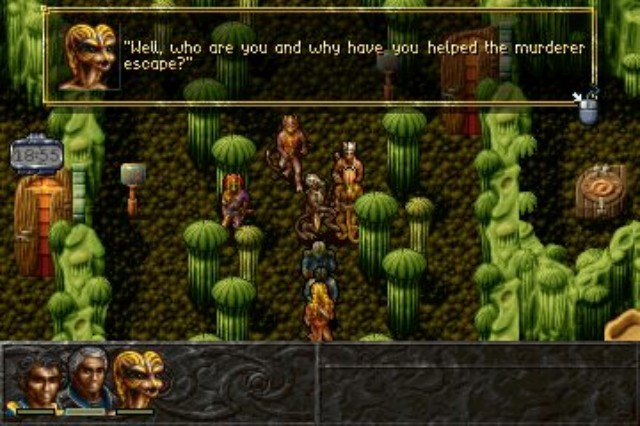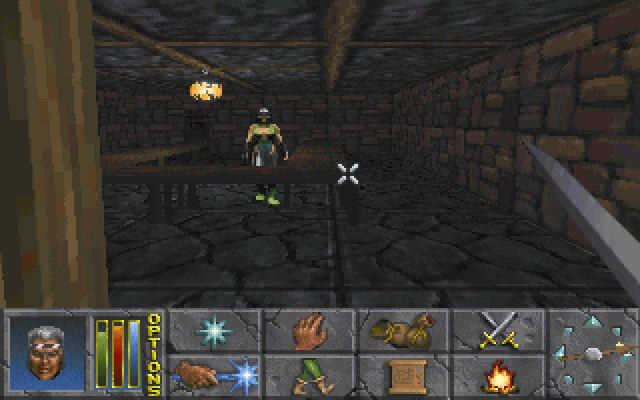The Game I'd want to play
I've seen a couple of presentations on game design over the years, and one very common piece of sensible advice is to aim making the kind of game you would want to play yourself. You won't be able to compete with the big publishers by trying to emulate that they are selling in the millions, so instead try to make something that you think would be fun to play but doesn't exist yet. If you think an idea is cool, there will be other people who also think it's cool. You won't directly be competing with anyone else's games, and you'll also have much more fun making it.
But let's be honest.
Make the game you'd want to play.
...and you might plausibly be able to actually make.
I can think of some really amazing games I would love to play, but don't have even the slightest clue about how any of the technologies that might be involved in making them actually work. Instead, I think I should try my hand at doing a low-resolution 2D isometric RPG first. No 3D modelling, no animating, no particle effects, no physics. I don't know anything about how any of those things are done. Instead, in a 2D game, it's all textures and sprites. I'm no good at making any of those, but I know how they are made and I have worked with the tools to make them.
RPG Maker is a thing, and that would probably be by far the fastest way to get something playable out that is of the general type of game I want to make. But, unless I am mistaken, it's using the basic gameplay of Final Fantasy games and what you're actually doing is drawing new maps and writing new dialogs to tell your own story. But if I am going to make the game I would want to play, it's not going to be a Final Fantasy clone. I don't just want to tell a story set in my world, I also have a lot of thoughts on the kind of gameplay I want to see. And I guess for that, I will have to go with a much more universal tool that provides much more freedom in designing game mechanics. I've heard about Unity and Godot, but know nothing really about them. To find the right software that will work best for my needs, I probably have to figure out what I want to make in the first place.
I've been working on a world for Dungeons & Dragons campaigns for a long time, and I've been doing a fair bit of actual game design in that arena as well. Both in regards to modifying or replacing specific game mechanics, and larger scale gameplay loops, incentive and reward systems, and things like that. This is an area of game design where I already have extensive experience, and where I frequently encountered limitations that I thought wouldn't be that much of an issue in a videogame. So making a fantasy RPG really is the obvious choice. And as I pointed out above, the fact that the gameplay of RPGs work perfectly fine with 2D sprite graphics massively lowers the technical barrier of entry for me.
There were a lot of RPGs in the 90s, with a very broad range of what that actually means in practice. But a few of them have stood out to me as examples for what I am vaguely imagining and that have gameplay elements that I feel could have a lot of value for what I want to make.
Wasteland (1988)

Now this is really oldschool, and surely I'll be able to make something that looks a lot more visually pleasing than this. This game is almost as old as I am and I only know about it from video reviews. But it stands out as something that is telling me that you can make a quite compelling game with very little, and that solid gameplay can hold up a game even when the visuals contribute very little. Certainly a game I'll have to get at least a few dozen hours in with, as a homework to introductory game design. Wastland is a game that is very light on the plot, but in which managing your resource is a significant point of the tension. Which is a gameplay element I find quite fascinating.
Dark Sun: Shattered Lands (1993)

This is another game that I have not actually played at all. But it's big on my radar for its visual design. The kind of world that I am aiming for has a very similar Sword & Sorcery style to Dark Sun, and I'm probably going to study this one quite a lot for it's texture design and color pallet.
Albion (1995)

Albion is a game that I have actually played. I always had a hard time getting into a game that looks like this after having previously played Baldur's Gate as my introduction to this type of game, and it's also more really more a Space Opera and not the classic fantasy I was looking for at that time. But I found the style of it's world really compelling, both in worldbuilding and the aesthetic that is being communicated through these in my opinion inadequate textures and sprites. It also is much heavier on the story with fairly little combat, which these days I find highly attractive.
Daggerfall (1996)

I have not played Daggerfall either (yet), but I have played a lot of Morrowind and Skyrim. Like the whole Elder Scrolls series, this game is actually in 3D and so probably not the best example for how I might implement things in the game I want to try making. But one thing that is really fascinating me about Daggerfall is it's approach to dungeons. Dungeons can be quite large and very non-linear, and the overall style of the game allows you to leave and come back later with better equipment and abilities without bringing the game to a sudden halt. I certainly want that kind of non-linearity. And I think there's a lot to study here in terms of textures and color palette as well.
Fallout (1997)

Fallout is a game I played for a while, but remember rather little of my own experience with it. And I think I did not enjoy it very much. But since then, I've watched a couple of long reviews of the game and I really quite like its approach to quest design that allows for more choices to be made by the player.
System Shock 2

Another 3D game, and this one probably has even less overlapp with the general game concept I am having in mind. But the thing I really like about System Shock 2 is how it approaches level design. To accomplish what you mean to do in an area, you have to move back and forth through it will interacting with different objects in different rooms. While at the entire time there's too many enemies roaming around to all take out with your limited ammo and health, but you're also able to run away and lose them if you fail to avoid getting their attention. Really not sure how such gameplay would be done in a 2D game because I don't recall ever seeing or even hearing about that being done, but it's one direction I am really interested in to explore.
Design Concepts I want to try
After playing around a bit with RPG Maker, and realizing that I really don't want to make a Final Fantasy clone type of game, I started thinking about gameplay elements I have encountered in the past that made me think that they are archaic designs that designers stick with out of tradition, even though they actually work against the experiences I believe they are trying to produce for the players. Here's my list of the main things that have been standing out to me, and which I think could really have a lot of potential to make much more enjoyable and compelling games if done differently.
Do we have to kill everything we meet?
On Christmas, my mother mentioned out of the blue that one thing she's really looking forward to when retiring in two years is to start getting into videogames. She never had mentioned any kind of interest in that before in the 25 years since me and my brother had started playing a lot. It of course had me immediately thinking which of the game we have would be interesting for her to try out. And while I think she would be totally into the stories of say Mass Effect and The Witcher, I rally can't see her having any slightest level of interest in the hours over hours of combat slog that is interrupting these really well written adventures. I don't really see her becoming another Skyrim Grandma, even though she'd probably love exploring the environment. This also reminded me of the obscure little PS2 game Primal, which I think could have been an amazing adventure game like The Longest Journey. But they had to make it an action adventure, and the action parts are really pretty bad. I think I got stuck at some of the bosses for hours. Making players sit through hours of tedious fights to experience a great story that really isn't that much about piles and piles of mutilated corpses seems like really bad design. It's done because it's tradition for the genre, but it no longer serves an actual purpose for the main strengths of the game and has actually become detrimental to it.
Now I very much enjoy challenging fights in most games. I started playing all games on Hard by default years ago because I want to have to put real work into a fight and not just go through the motion for a victory that is inevitable. But I want to make a game that is not about combat, and as such I don't want the other parts of the game blocked off for people who might enjoy them but don't want to deal with the combat. So one idea I want to pursue is to design the entire game in a way that it is possible to play through it without having to kill anyone, and it being presented as a legitimate way to complete the game properly. This of course raises questions about character progression and XP. Which is a topic big enough that I want to cover it in a future post on its own.
Defeat should not stop the game
One thing that has long been frustrating me about most games that have fighting in them is that you can not progress the game unless you win every single fight that you get into. Losing a fight is not an option. Either you win the fight right away, or you have to repeat fighting it again and again until you do. At the end of Metal Gear Solid, there's the big showdown fight between the hero and the villain, in which the villain dramatically challenges you to a one on one fight to finally settle which of you is the superior fighter. If you beat him on your first try, it's very cool and very dramatic. If you lose, if I remember correctly, the villain will taunt you that he is the superior fighter before the game over screen and you're allowed to reload the last save. Eventually I did defeat him. But it really didn't feel like I had proven I am the superior fighter when the final score of our repeated fights was 1:32. No, I had been completely obliterated and my ass handed to me. And of course, it had stopped being fun after I lost the 10th time or so. It really soured the game for me in the final two or three hours. And this is not unique to Metal Gear Solid. I had similar experiences with many, perhaps even most of the game I had played through to the end.
When you play roleplaying games like Dungeons & Dragons, Vampire, or Shadowrun, or whatever the kids play these days (yes, I'm that old), the situation is very different. There are no saves; there is no reloading. If you lose a fight, you'll have to live with the consequences. Or make a new character to take your old spot in the group. Now an iso-RPG in which you can not be killed would be a big departure, and it wouldn't really make sense for the kind of fantasy fiction I am interested in. But I want to make a game in which a fight, once started, does not have to only end in either all enemies being dead or reloading the last save. I want to make a game in which enemies will try to run away to save themselves, and in which it is a legitimate and sensible approach to retreat from a fight when the tide is turning against you. I also want to go further into this in a separate post about my larger thoughts on combat.
Chance-based dialog options suck
A lot of RPGs, at least as far back as Planescape: Torment, but probably even before that, have additional dialog options appear if your character has sufficiently high scores in certain attributes, and there might also be a randomized chance, modified by your attribute, that determines how the NPC you're talking to will reply. Cool idea, but since we're dealing with a type of game in which you can always reload an old save and try again, it actually sucks as a game mechanic.
If you have a dialog option available that has a 20% chance to successfully convince an NPC to not murder some hostages and you fail, it really sucks. But when that is something you really don't want to happen in your game, and you have the option to reload the last save and go through the whole dialog again, why wouldn't you? When you have the option to reload as many times as you want, then the random chance for success becomes actually meaningless. The bad thing will only happen in your playthrough if you choose so. The only thing that disincentivizes you from reloading as many times as it takes is the tedium of the process. Annoyance should never be the motivator behind player choices.
Having dialog options change depending on your character and choices you have made in the game, I believe these determining variables should be completely hidden from the players. Don't let the players know under what conditions an option becomes available. And when the choice of a dialog option determines what will happen in the story, don't have it happen immediately. Have the consequences of the choice become apparent only much later in the game. Realizing that you have clicked the wrong dialog option in the middle of the dialog and then waiting for the dialog to end so you can open the menu to reload just sucks. When the actual impact only shows itself much later, it's much less likely to feel like all of this happened because you clicked on one dialog wrong, and more like a development of the story.
Choices and consequences instead of plot
Lots and lots of people will very violently disagree on this, and there have been countless hugely successful games that have made hundreds of millions in sales that are doing exactly this kind of thing. But I think it's a really wasteful use of the medium if you simply use it to tell the players a great story about a cool villain, while the players are playing a passive generic dude who mostly just learns what has already happened when they are not currently butchering hundreds of faceless minions. If you really want to tell a story like a movie or a TV show, make a movie or a TV show. Don't slap it on a fighting game.
I think that it's much more interesting to instead have the player's character be the main subject of the game. The story of the game should be about you and your experiences. Your actions and choices should be the main driving force that steers the story of the game.
Story emerging from gameplay
Many RPGs proudly claim that they let the players make big choices that affect the story. But in reality, they mostly just let players occasionally pick between two different pre-written paths that basically run in parallel and then more or less end at the same place anyway, with the only difference being in which cutscene plays before the credits. What I found in recent years is that the most memorable sequences of events in games, which you might call "stories", usually happened in games that don't really have much in the way of a written plot. Prime example here is Kenshi. Kenshi is an open world game in which you can collect stuff, craft stuff, and trade stuff, and will run into random encounters with wandering enemies. There really is not a lot more to that. With the resources you gather you can make a small house nearly anywhere in the world. Or a huge fortress where dozens of hired henchmen are running elaborate cannabis factories for you. But there's all kinds of bandits and monsters inhabiting the desert with you and they might come close to your base and decide to attack it and loot your storage boxes. Or might randomly cross path with your characters while they are traveling to a town, try beating them up, and loot their inventories. How exactly these interactions play out depend overwhelming on which characters you have in your party, how many of them are currently present in the place the encounter takes place, how you trained and equipped your people, what previous injuries they have, and how much the weight of their cargo is slowing them down. When you fight, some of your people will suffer injuries, and that will impact their ability to fight for the next day or two. When you get defeated, you might get robbed of important supplies. Things that can completely disrupt your travel plans and force you to make stop at towns you didn't mean to visit. Or you might find a group of strong bandits camping in the mountain pass you wanted to cross and you have to choose between trying to sneak pas them, or try a long detour that might lead you into other dangerous situations you really didn't anticipate or prepare for. So much stuff can happen and nothing of it is prewritten or scripted. It all happens because of decisions you made. The decision to journey to the next city now instead of one hour later. The decision to have all characters in the caravan carry a maximum load to sell as much of your goods in town as possible. The decision to leave only three people home to hold the fort instead of eight. There are several many-hours long series of Kenshi playthroughs on youtube and they are full of amazing stories that make big budget prestige games look flat and uninspired. Kenshi is a quite different type of game from the kind I want to try my hand at, but this game has shown me more than anything else how much story you can have emerging from just the gameplay, without any kind of plot. I don't consider myself much of a great writer and I don't think I could write an very interesting plot for a game. But having stories emerge from a form of gameplay that is quite open ended could supplement that greatly.
Next up (probably? maybe?), a first vague general outline of a concept for what my game might look like.

Comments